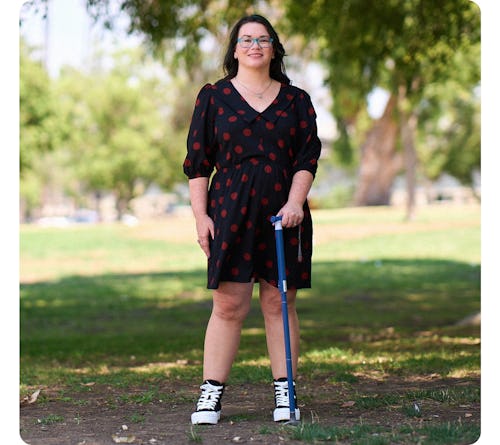
As a working mom raising two children under the age of three, Sarah was constantly taking care of other people’s needs. One day while she was rushing to her son’s side after hearing him crying, Sarah’s left leg went numb, which resulted in a fall that landed her in the emergency room. Concerned about the loss of feeling in her leg, along with other recent symptoms, such as forgetfulness, a nurse scheduled an MRI. The neurologist on call diagnosed Sarah with multiple sclerosis (MS), a chronic inflammatory disease that damages the central nervous system and disrupts the flow of information between the brain and body.¹ ² Later, after consulting with another neurologist, Sarah learned she had relapsing MS (RMS), the most common form of MS, which is characterized by periods of relapses or “attacks,” followed by remissions.² ³
Sarah’s diagnosis made her reevaluate her role as her family’s primary caretaker and instead lean on them for support, which is vital for anyone navigating life with RMS.
So, how do people living with RMS find and sustain their own support squad? We talked to four individuals, including Sarah, about the importance of surrounding yourself with loved ones, how to engage the people in your life who want to help, and how to seek out resources if you’re feeling alone.
Sarah: Find An Online Support Group

Sarah feels “incredibly lucky” to have had the full-fledged support of her family members over the past 12 years. “We all felt the impact when I was diagnosed with RMS,” she explains. “Fortunately, my entire family was always there for anything that I needed, even if they were a phone call away, and my mom made a point to come to every doctor’s appointment.”
Sarah is especially grateful for her family members, as she knows not everyone living with RMS has people they can rely on. For those who feel isolated due to their diagnosis, Sarah recommends seeking support online from others living with RMS.
“With online support, you can find people your age, close to where you live, and who are experiencing the same stage of RMS as you — whether you’ve just been diagnosed with RMS or have been living with it for years,” she explains. “Those people can also share insights in a different way than your well-meaning friends without a chronic condition can.”
Another way to spot a potential member of your support team? She suggests looking for people who are truly excited for you when you get good medical news.
According to Sarah, trust, empathy, and the ability to laugh and cry together are important qualities to consider when seeking a support squad.
Jamie-Lynn: Turn To Individuals You Trust

Jamie-Lynn was just 20 years old and working as an actor when she was diagnosed with RMS. She was on a hit show and felt healthy, making the diagnosis that much more unexpected.
Worried that going public with her diagnosis would impact her career, Jamie-Lynn decided to keep it a secret. In hindsight, she realizes the secrecy deprived her of the ability to have a greater support system, as well as the opportunity to spread awareness about RMS. Fortunately, Jamie-Lynn was able to confide in her family and a small group of girlfriends, all whom continue to be there for her. She recommends turning to individuals you trust, who encourage you to share your feelings, and most importantly, who see you for more than your diagnosis.
Jamie-Lynn says: “My girlfriends have been shoulders to cry on. They've been encouraging me to talk about the hard stuff and have welcomed those discussions with open arms. They've also been there to remind me that they don't see RMS when they look at me, and that my value as a person and who I am is still the same. I would be nothing without my ladies, my mom squad, all of them. They are the reason that I have the strength to sit here today, no doubt.”
Karina: Surround Yourself With Supportive People Who Encourage New Experiences

Since receiving her RMS diagnosis two years ago, Karina has been adamant about sharing her experience with those around her and on social media. Her goal is not only to spread awareness about RMS, which can be an “invisible illness,” (one that isn’t always apparent to an outside party) but also to help those living with the condition feel less alone.⁴ While Karina is fortunate to have the support of her friends, family, and most importantly, her husband, she recognizes that not everyone is as lucky to have such a strong support system. That’s why she began sharing her journey on social media.
As soon as she started posting about her life with RMS, she received tons of supportive messages.
“People reached out to share their stories [of RMS], some saying that I was their only support system because they felt misunderstood or invalidated,” Karina explains. “This made me realize how important it is to even have just one person that supports you.”
Karina also believes it’s important to have members of your support squad who encourage you to continue trying new things and having new experiences — like her kids, who inspire her to travel, and her husband, who shares her newfound love for music festivals. Finding an MS medication that would give Karina the time to enjoy the things she loves and explore new activities was also key.
KESIMPTA®, also known as ofatumumab, is a once-a-month* treatment for RMS that Karina can take herself at home or on the go with a pre-filled auto-injector pen. When ready, treatment time typically takes less than a minute a month (after completing the three weekly starter doses.)⁵ She values the flexibility of KESIMPTA, which fits well into her current lifestyle.
Kamryn: Connect With Others Living With RMS

Kamryn, a mother of three living in Georgia, was diagnosed with RMS last year and recognizes that having a strong support squad in place is essential. While Kamryn’s family has been a dominating force in supporting her since her initial diagnosis, she’s also found it incredibly helpful to connect with others living with RMS.
“There’s so much value in being able to connect with people who can truly understand what you are going through — not just being compassionate and empathetic but really understanding,” she explains. Knowing that others have experienced what you are going through can also help you discover new potential treatment options. Kamryn, who also takes KESIMPTA, likes the way it fits into her schedule and its proven results**. “I don’t have to go anywhere, it’s delivered to me, and I just self-administer at home in the privacy of my bathroom,” she says.⁵
“For me, in the beginning, I was shocked and a little afraid,” Kamryn says. “I didn't know much about RMS. Between my MS specialist, people I met who live with RMS, and my family that works in the medical field, it really helped ease my mind. It put me more in a place of understanding and being proactive versus feeling fear and being reactive.”
Large or small, a support squad is essential to help you navigate an RMS diagnosis. KESIMPTA helps patients’ support squads grow by providing an Alongside™ coordinator to guide them through every step of their treatment journey. When Kamryn started her treatment with KESIMPTA, she initially hesitated about choosing an injectable medication, but with the help of her Alongside patient coordinator and the other resources she received, she found that KESIMPTA was the right treatment for her. Learn more at KESIMPTA.com.
*Once monthly after 3 weekly starter doses. Typical administration time when ready to inject.
**In two studies vs. teriflunomide
Important Safety Information
Who should not take KESIMPTA?
Do NOT take KESIMPTA if you:
- have an active hepatitis B virus (HBV) infection.
- have had an allergic reaction to ofatumumab or life-threatening injection-related reaction to KESIMPTA.
What is the most important information I should know about KESIMPTA?
KESIMPTA can cause serious side effects such as:
- Infections. Serious infections, which can be life-threatening or cause death, can happen during treatment with KESIMPTA. If you have an active infection, your health care provider (HCP) should delay your treatment with KESIMPTA until your infection is gone. KESIMPTA taken before or after other medicines that weaken the immune system may increase your risk of getting infections. Tell your HCP right away if you have any infections or get any symptoms including painful and frequent urination, nasal congestion, runny nose, sore throat, fever, chills, cough, or body aches.
- HBV reactivation. If you have ever had HBV infection, it may become active again during or after treatment with KESIMPTA (reactivation). If this happens, it may cause serious liver problems including liver failure or death. Before starting KESIMPTA, your HCP will do a blood test to check for HBV. They will also continue to monitor you during and after treatment with KESIMPTA for HBV. Tell your HCP right away if you get worsening tiredness or yellowing of your skin or the white part of your eyes.
- Progressive Multifocal Leukoencephalopathy (PML). PML may happen with KESIMPTA. PML is a rare, serious brain infection caused by a virus that may get worse over days or weeks. PML can result in death or severe disability. Tell your HCP right away if you have any new or worsening neurologic signs or symptoms. These may include weakness on one side of your body, loss of coordination in arms and legs, vision problems, changes in thinking and memory, which may lead to confusion and personality changes.
- Weakened immune system. KESIMPTA taken before or after other medicines that weaken the immune system could increase your risk of getting infections.
Before you take KESIMPTA, tell your HCP about all your medical conditions, including if you:
- Have or think you have an infection including HBV or PML.
- Have ever taken, currently take, or plan to take medicines that affect your immune system. These medicines could increase your risk of getting an infection.
- Have had a recent vaccination or are scheduled to receive any vaccinations.
- You should receive any required ‘live’ or ‘live-attenuated’ vaccines at least 4 weeks before you start treatment with KESIMPTA. You should not receive ‘live’ or ‘live-attenuated’ vaccines while you are being treated with KESIMPTA and until your HCP tells you that your immune system is no longer weakened.
- Whenever possible, you should receive any ‘non-live’ vaccines at least 2 weeks before you start treatment with KESIMPTA.
- Talk to your HCP about vaccinations for your baby if you used KESIMPTA during your pregnancy.
- Are pregnant, think that you might be pregnant, or plan to become pregnant. It is not known if KESIMPTA will harm your unborn baby. Females who can become pregnant should use birth control (contraception) during treatment with KESIMPTA and for 6 months after your last treatment. Talk with your HCP about what birth control method is right for you during this time.
- Are breastfeeding or plan to breastfeed. It is not known if KESIMPTA passes into your breast milk. Talk to your HCP about the best way to feed your baby if you take KESIMPTA.
Tell your HCP about all the medicines you take, including prescription and over-the-counter medicines, vitamins, and herbal supplements.
How should I use KESIMPTA?
See the detailed Instructions for Use that comes with KESIMPTA for information about how to prepare and inject a dose of KESIMPTA and how to properly throw away (dispose of) used KESIMPTA Sensoready pens or prefilled syringes.
- Use KESIMPTA exactly as your HCP tells you to use it.
- Your HCP will show you how to prepare and inject KESIMPTA the right way before you use it for the first time.
- Do not inject into areas where the skin is tender, bruised, red, scaly or hard. Avoid areas with moles, scars, or stretch marks.
KESIMPTA may cause serious side effects including:
- Injection-related reactions. Injection-related reactions are a common side effect of KESIMPTA. Injecting KESIMPTA can cause injection-related reactions that can happen within 24 hours (1 day) following the first injections and with later injections. There are two kinds of reactions:
- at or near the injection site: redness of the skin, swelling, itching, and pain. Talk to your HCP if you have any of these signs and symptoms.
- that may happen when certain substances are released in your body: fever, headache, pain in the muscles, chills, tiredness, rash, hives, trouble breathing, swelling of the face, eyelids, lips, mouth, tongue and throat, and feeling faint, or chest tightness. Contact your HCP right away if you experience any of these signs and symptoms, especially if they become worse or you have new severe signs of reactions after subsequent injections. It could be a sign of an allergic reaction, which can be serious.
- Low immunoglobulins. KESIMPTA may cause a decrease in some types of antibodies. Your HCP will do blood tests to check your blood immunoglobulin levels.
The most common side effects of KESIMPTA include:
- Upper respiratory tract infection, with symptoms such as sore throat and runny nose, and headache.
- Headache.
You are encouraged to report negative side effects of prescription drugs to the FDA. Visit www.fda.gov/medwatch, or call 1-800-FDA-1088.
Please see full Prescribing Information including Medication Guide.
Indication
What is KESIMPTA (ofatumumab) injection?
KESIMPTA is a prescription medicine used to treat adults with relapsing forms of multiple sclerosis (MS) including clinically isolated syndrome (CIS), relapsing-remitting disease, and active secondary progressive disease.
It is not known if KESIMPTA is safe or effective in children.
References
- Trip, SA, Miller DH. Imaging in multiple sclerosis. J Neurol Neurosurg Psychiatry. 2005 Sep;76 Suppl3(Suppl3):iii11-iii18.
- Hunter SF. Overview and Diagnosis of Multiple Sclerosis. Am J Managed Care. 2016;22:S141-S150
- Multiple Sclerosis International Federation. Atlas of MS 3rd Edition. Part 1: Mapping multiple sclerosis around the world. Accessed July 28, 2023.
- AMA J Ethics. 2021;23(7):E512-513.
- Kesimpta Prescribing Information. East Hanover, NJ: Novartis Pharmaceuticals Corp; April 2024.
7/24
424515
0 comments:
Post a Comment